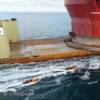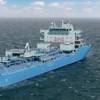"Very poor weather, major repairs to a lock on the Gulf Intracoastal Waterway and rapidly escalating fuel prices, not lower business levels, are the factors causing Kirby to revise its first quarter forecast," were a few reasons that Joe Pyne, Kirby Corporation's President CEO, cited for the company's lowering of its earnings guidance for the 2003 first quarter to $.26 to $.30 per share from previous guidance of $.36 to $.40 per share. "Not only have our transit times been slower, but we also have been forced to use additional horsepower to meet scheduling demands."
Navigational delays due to fog along the Gulf Coast, both high and low water issues on the Mississippi River, and major repairs to a critical lock on the Gulf Intracoastal Waterway, have resulted in increased transit times. Navigational delays increase transit times, which reduce revenues and increase operating expenses. For the 2003 first quarter, Kirby estimates that navigational delays will increase by 18 percent when compared with the first quarter of 2002.
During the 2003 first quarter, Kirby has also experienced a significant increase in its fuel costs. The average price per gallon consumed in the first two months of 2003 was $1.00, up 22 percent from the 2002 fourth quarter average of 82 cents, and 72 percent higher than the 2002 first quarter average of 58 cents. Currently, Kirby is paying an average of $1.20 per gallon. Approximately 70 percent of Kirby's marine transportation revenue is from term contracts, which contain fuel escalation clauses allowing increases or decreases in fuel prices to be passed through to the customers; however, there is a 30 to 90 day delay before contracts are adjusted for fuel costs. The balance of Kirby's marine transportation revenue is from spot market business, and market forces dictate whether spot market pricing will allow Kirby to recover fuel cost increases. The increase in fuel costs in the 2003 first quarter is anticipated to cost Kirby an estimated $.04 to $.05 per share of net earnings.
"Although we have adjusted earnings for the first quarter, our transportation markets continue to be at least consistent with the last half of 2002, except for fertilizer, which is being affected by high natural gas price," Pyne said. " The fertilizer season will be delayed until early in the second quarter. Given the uncertainty in the economy, our current business levels are actually somewhat encouraging. We have been and are continuing to prepare Kirby for an upturn in the economy. Last year, we acquired Cargill's tank barge fleet, part of Coastal Towing's tank barge fleet and signed a barge management agreement for the balance of their active fleet, and purchased the Dow Union Carbide tank barge fleet. In the first quarter of 2003, we acquired ExxonMobil's inland tank barge operation. We also recently completed a $250 million, interest only, 10-year private placement, which adds a significant long-term component to our capital structure and frees up our $150 million bank revolving credit facility. All of this puts us in great shape for the future."
Kirby Corp., based in Houston, Texas, operates 911 inland tank barges and 226 inland towing vessels, transporting petrochemicals, refined petroleum products, black oil and agricultural chemicals throughout the United States inland waterway system.
OIG Issues Audit of Title XI Loan Guarantee Program
The Department of Transportation Office of Inspector General (OIG) issued its Report on the Audit of the Title XI Loan Guarantee Program. The audit examined whether proper procedures were followed and the impact of recent bankruptcies. As of December 2002, the Title XI portfolio totaled approximately $4.3 billion in executed loan guarantees and loan guarantee commitments. The report discussed the impact of the American Classic Voyages Co. (AMCV) bankruptcy ($1.3 billion in loan guarantees) and potential problems with loan guarantees to companies that are subsidiaries of Enron Corporation ($122 million in loan guarantees). The OIG recommends that the Maritime Administration undertake more effective oversight of the loan application and review process (including a risk analysis and external review); more vigorous financial oversight of borrowers during the term of the loan guarantee; better monitoring and protection of vessels and shipyards while under the loan guarantee; and more effective stewardship of foreclosed assets.
Sponsored Content
Innovative Hull Maintenance: Profitable & Green

Subscribe for
Maritime Reporter E-News
Maritime Reporter E-News is the maritime industry's largest circulation and most authoritative ENews Service, delivered to your Email five times per week













